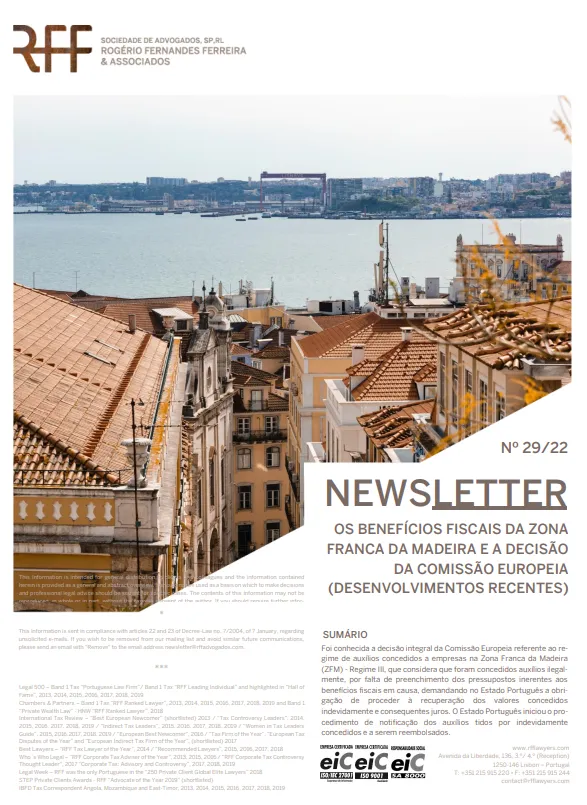Tax benefits for Madeira´s Free Trade Zone European Commission’s Decision

Tax benefits for Madeira´s Free Trade Zone European Commission’s Decision
SUMMARY
It was published the full decision of the European Commission on the benefit regime granted to companies in Madeira´s free trade zone - Regime III, which considers that the benefits were granted illegally, due to the lack of fulfillment of the requirements inherent to the tax benefits in question. The European Commission is requiring the Portuguese State to recover the amounts unduly granted and the consequent interest. The Portuguese State initiated the procedure for notification of the benefits considered unduly grant-ed and to be repaid.
FRAMEWORK
The Madeira’s Free Trade Zone was created by Decree-Law no. 500/80 of October 20, with the purpose of promote the economic and social development of the Autonomous Region of Madeira, offering, for that purpose, several tax benefits to companies setting up there.
Over the years, four tax regimes applicable to entities licensed to operate in the Free Zone of Madeira have been established. Currently, the Regime III and the Regime IV are in force.
In both Regimes, the maximum amounts on the taxable income - to which the reduced rate applies - are determined according to the number of jobs that the beneficiary entity maintain in each year.
REQUIREMENTS
Two of the requirements for entities licensed in Madeira’s Free Trade Zone to access the tax benefits provided by law, thus benefiting from a reduced rate of taxation, are (i) the creation of jobs, and (ii) that the profits that benefit from the tax reduction must be related to activities effectively and materially carried out in Madeira.
It should be noted that it is the number of jobs created/maintained in each year that is the essential element for determining the maximum amounts of the tax base to which the reduced rate is applicable.
MAXIMUM AMOUNT
The income of entities licensed to operate in Madeira’s Free Trade Zone may be subject to corporate income tax at a reduced rate. That rate has been set at 5% for the years 2013 to 2027.
However, the benefit is limited by applying maximum amounts to the taxable income to which a reduced rate is applicable, depending on the number of jobs that the beneficiary entity maintain in each fiscal year, as follows:
- EUR 2,73 million for the creation/maintenance of one to two jobs;
- EUR 3,55 million for the creation/maintenance of three to five jobs;
- EUR 21,87 million for the creation/maintenance of six to 30 jobs;
- 35,54 million for the creation/maintenance of 31 to 50 jobs;
- EUR 54,68 million for the creation/maintenance of 51 to 100 jobs; and
- 205.50 million for the creation/maintenance of more than 100 jobs.
EUROPEAN COMMISSION'S DECISION
Considering the requirements to access the tax benefits and, in order to audit them, the European Commission carried out an investigation in which it concluded:
- that the number of jobs taken into account by Portugal for calculating the amount of benefits under the regime included jobs created outside the free zone of Madeira and even outside the EU;
- that part-time jobs have been included in full-time jobs and board members have been counted as employees in more than one entity that benefited from the regime; and
- that the profits that benefited from the tax reduction were not limited to profits related with activities effectively and materially carried out in Madeira.
In this context, and following the decision of the European Commission, December, 4 2020, but only published in May 2022, the Portuguese State - through the Portuguese Tax Authorities - must notify all entities that allegedly benefited wrongfully from such state aid.
Thus, if notified by the Portuguese Tax Authorities, the entities that cannot demonstrate that their taxable income or jobs created are linked to activities carried out in the region, i.e., that they have not really contributed to the development of the region, may, in theory, have to repay the amounts relating to the tax advantage granted.
DEVELOPMENTS
The Portuguese Tax Authorities has started the process in accordance with the European Commission's decision, notifying the entities identified as beneficiaries of such state aid, allegedly unduly or illegally.
As a first step, these taxpayers may (should) exercise their legal right to be heard and, naturally, contest the amounts attributed to the correction of the taxable income resulting from the European Commission's decision, following the consideration that they meet the necessary conditions for the granting of the benefits in question.
Subsequently, and in case of a non-favorable decision, the tax assessment may be issued regarding corporate income tax, which may also be argued.
It should be noted that the amounts in question will consist of the correction of the corporate income tax (IRC) and the correspondent interest counting from the date on which the benefit was made available until the date of its effective recovery.
It should also be pointed that although the Portuguese State (through the Portuguese Tax Authorities) is proceeding with the European Commission's decision, it has appealed that same decision to the European Union Court of Justice, arguing, in essence, that:
- Madeira’s Free Trade Zone regime is part of the general economy of the Portuguese tax regime, and these measures should be seen as general measures and not as measures of state aide;
- this regime is not selective, since the benefit does not favor certain companies or certain productions;
- if Madeira’s Free Trade Zone regime implied an aid, it would have to be considered as an existing aid;
- carrying on its activities in Madeira should only mean that the activity is carried out in Madeira through a head office, management and decision-making center, without the need for human capital;
- there can be no geographical limitation to the activities, which cannot mean that they must be limited to the territory of Madeira, this restrictive interpretation is not consistent with the European Union's jurisprudence on the center of main interests;
- European Union law does not adopt a uniform concept of 'contract of employment' or 'employment relationship' or 'worker' or, consequently, of 'employment position;
- the spirit of European Union´s law and EU jurisprudence is to accept and protect the various types of employment relationships;
- Madeira’s Free Trade Zone of Madeira is not an employment aid regime, but rather a regime to aid the diversification and modernization of Madeira. The purpose of Madeira’s Free Trade Zone regime is primarily to contribute to the regional gross domestic product.
CONCLUSION
In view of the above, and considering that the outcome of which is not yet known, it is important that taxpayers notified, or to be notified, of modifications to the taxable income - resulting from the decision of the European Commission - exercise the means of defense available, with a view to opposing the corresponding amounts (of tax and interest), proving both the verification of the necessary assumptions and discussing the interpretation of the European Commission, announced in its decision, which is now public.
***
Lisbon, August, 08, 2022
Rogério M. Fernandes Ferreira
Marta Machado de Almeida
Miriam Campos Dionísio
João Freitas Jacob
(Tax Advisory Team)
